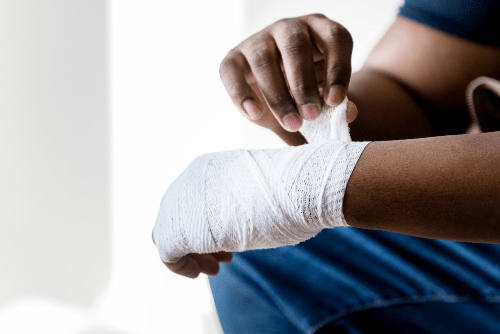When it comes to falls, the Bureau of Workers Compensation (BWC) has requirements that have to be met in order for the accident to qualify for coverage. Just being on the clock or at your employer’s location is not enough.
Trip and Fall Injury
Trip and fall injuries can happen no matter what type of occupation you have and are especially common. When you trip, the body typically falls forward. You tend to use your hands and knees to brace your fall. Therefore, a trip and fall tends to cause injuries in the hands, knees, face, or wrists. This is different from a slip and fall. (Read more about the differences here.)
Even if your accident and the resulting injury doesn’t seem serious, it’s still a good idea to get it examined by a doctor and to report the incident to your supervisor. Failure to do so may jeopardize ability to get Workers’ Compensation benefits for this injury in the future.
Trip and fall accidents may require medical attention and time away from work. If this has happened to you, consider filing for Workers’ Compensation to help pay for your medical treatment and related expenses.
Common Causes of Trip and Fall Injuries
Many types of soft tissue, bone, and nerve damage from trip and fall injuries can take weeks or even years to present themselves and you’ll need to have the medical evidence and paperwork to back you up in a Workers’ Compensation claim.
The most common causes include:
- Tripping on wires or debris
- Tripping on uneven concrete or pavement
- Falling or tripping due to damaged work equipment or unkempt property
- Falling from height (fall from scaffolding or other work equipment)
Trip and fall injuries in the workplace can have serious consequences. If you’ve experienced a trip and fall injury on the job and are having trouble paying for medical bills or making up for last wages, pursuing a Workers’ Compensation claim may help you stay financially afloat.
In a time that’s probably already confusing and stressful, it’s important that you follow these steps:
- report the incident to your supervisor
- see a doctor as soon as possible for treatment of injuries
- write down your account of the event that led up to the accident and what occurred afterward
- make a list of possible witnesses
Getting Your Workers Comp Claim Approved
You have to know the reason you fell. Simply reporting that you fell at work won’t be enough to get you workers’ compensation benefits. You also have to have suffered a fall that was somehow related to your job. If you fell because you were texting and walked off a curb…chances are that’s not going to be covered. If you fell because there was equipment being improperly stored and lose cables caused you to trip and fall, well, that’s a valid case.
If your fall at work was because an altercation with a co-worker turned physical, you likely will not be covered because workers compensation does not cover injuries stemming from personal disagreements. If you fell because you were drunk or high at work, you will not be eligible to receive workers’ compensation benefits because you were doing something that was not within the scope of your job. (Read more about drug use and workers comp claims here.)
If I was traveling for work and fell, can I get workers comp?
Let’s say you’re on your way back to the office after a business meeting but then make a small detour to stop by the grocery store and get injured in the process, you’re not eligible for workers’ compensation benefits. Once you veer off the path and embark on an errand that is not related to your job, workers’ compensation will not cover your injuries because this was no longer related to your job duties.
The difference between your claim being approved or denied often lies in the details. If you are still unsure if your injuries will be covered, call attorney Thomas Marchese. Workers Comp is all we do. The discussion is confidential and without obligation. Let’s get started.




